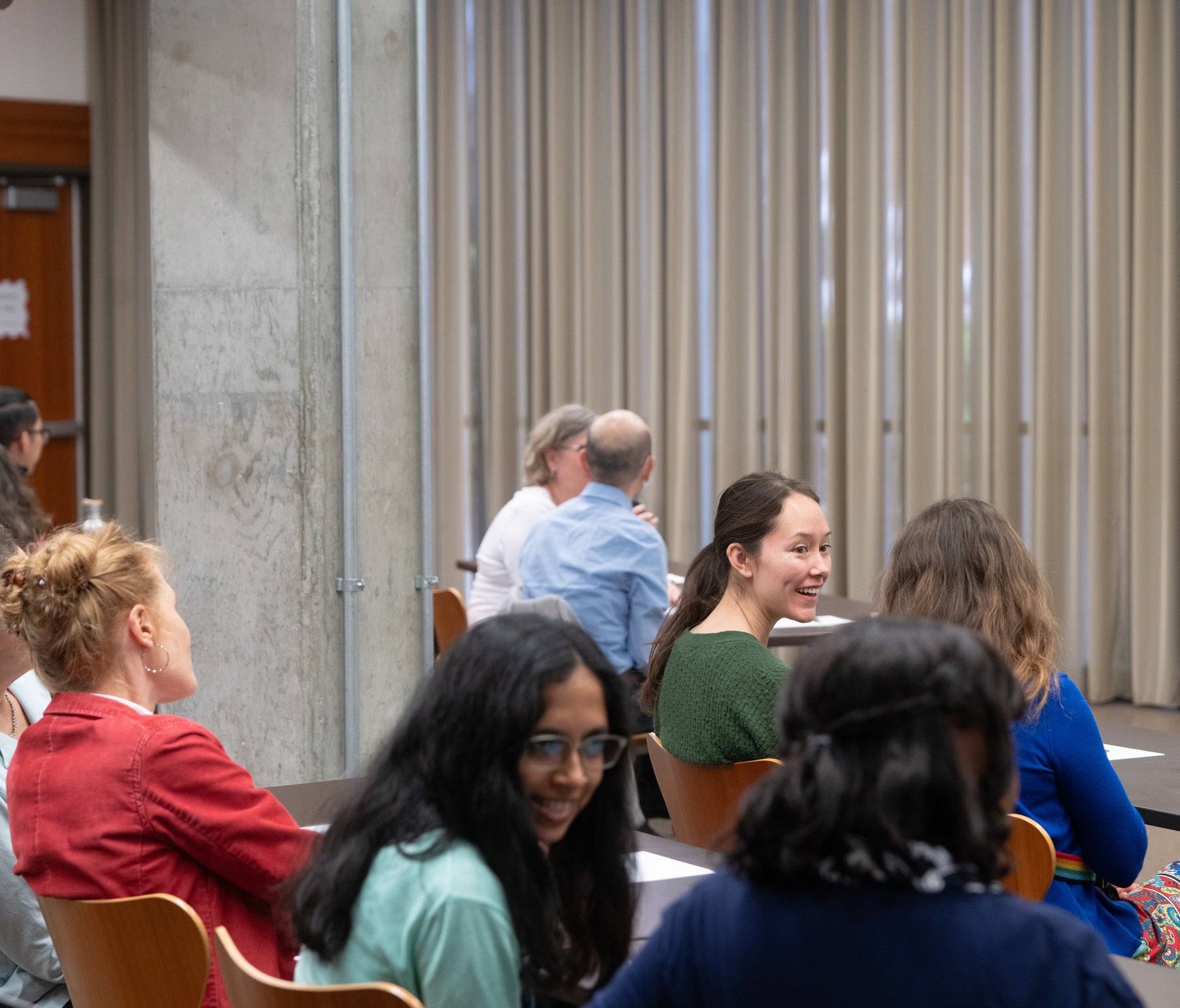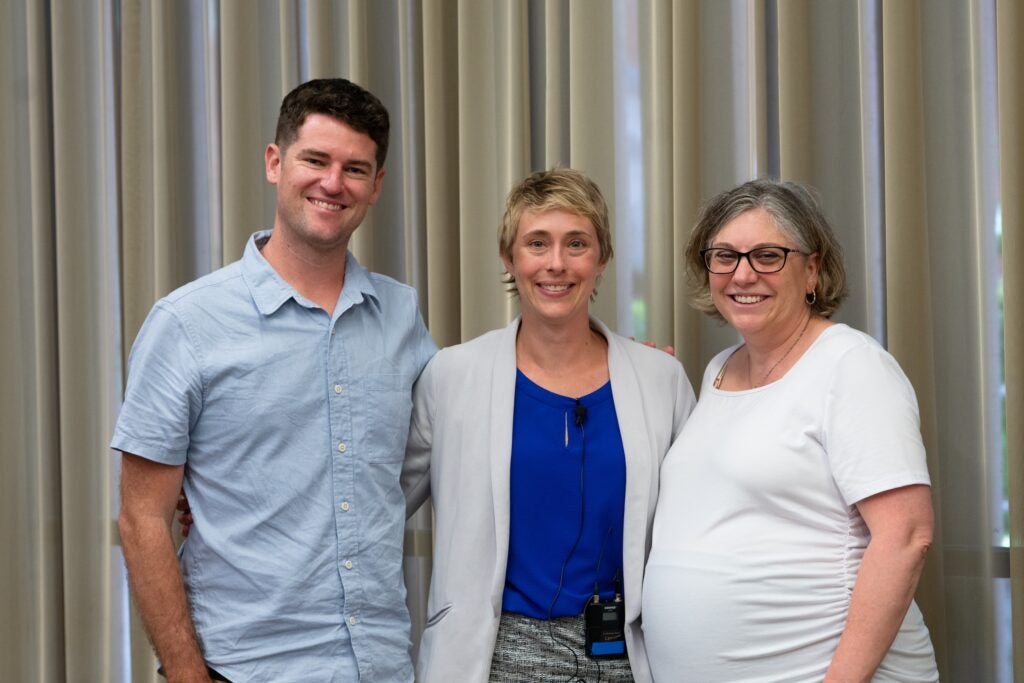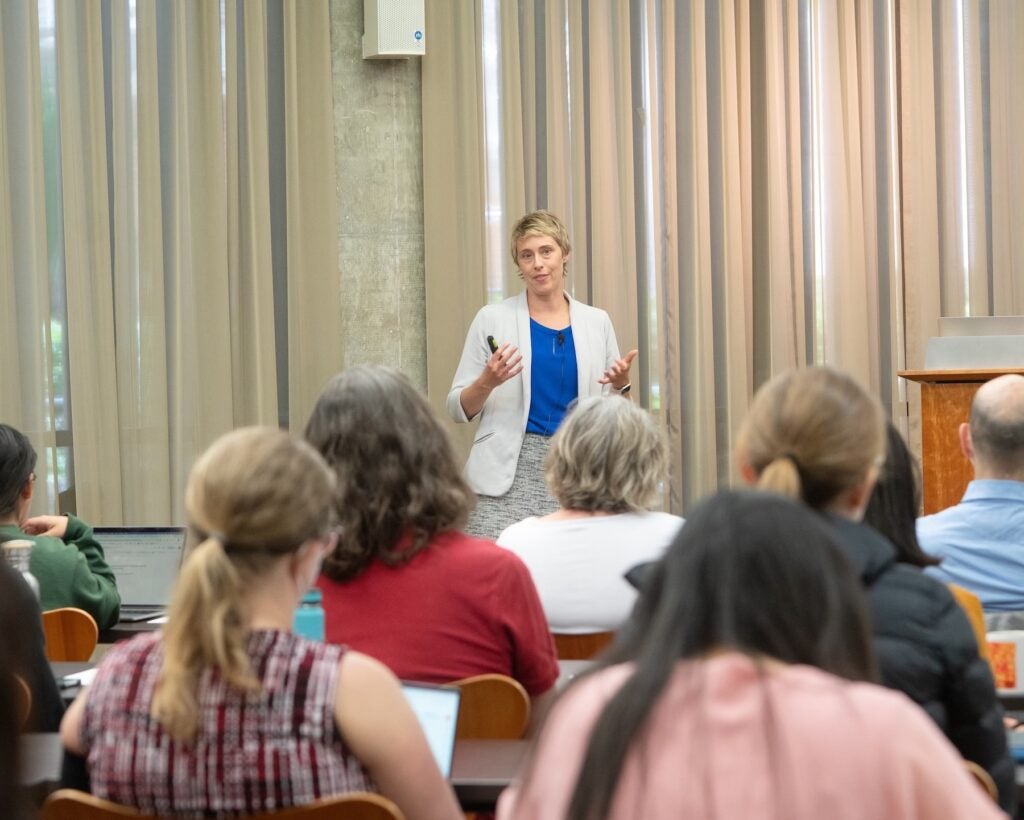While disciplinary expertise is critical for instructors to have when teaching a particular subject, pedagogical research has shown that successful teaching requires more than this knowledge alone.
“Recall a time you had an instructor with impressive disciplinary knowledge but who was not an impressive instructor in the classroom,” asked Tessa Andrews, a Josiah Meigs Distinguished Teaching Professor of Genetics and the Director of the Scientists Engaged in Education Research (SEER) center at the University of Georgia. The group of instructors gathered to hear Andrews speak shared a knowing look while she continued. “I’m giving no time to think about it because I’m sure you’ve already recalled one.”
In her talk, “Making the Most of Active Learning: Why Teaching Expertise Matters and How it Develops,” Andrews presented on how instructors’ subject matter expertise and teaching knowledge impact active learning settings. It was the latest Educational Innovation & Scholarly Teaching Seminar, a speaker series featuring pedagogical experts that share research insights with instructors. The series is hosted by the UCLA Teaching and Learning Center (TLC) and sponsored by the Vice Provost for Teaching and Learning.
“The TLC brings cutting-edge instructional perspectives to campus each month to provide instructors access to research-based teaching practices,” highlighted Vice Provost for Teaching and Learning Erin Sanders O’Leary. “We hope to facilitate conversations between leading education researchers and our instructional community to advance teaching excellence.”
The May seminar outlined the connection between teacher knowledge, classroom practices, and student outcomes in active learning environments. Andrews first identified the teacher knowledge types instructors bring into the classroom, including disciplinary knowledge (knowing content about a specific subject), pedagogical knowledge (generalized knowledge of effective teaching strategies), and pedagogical content knowledge (specific knowledge about teaching and learning within a particular disciplines and the conceptions students hold about those topics).
Andrews highlighted how instructors can effectively utilize their pedagogical content knowledge and pedagogical knowledge to create dynamic classroom opportunities to develop students’ critical thinking around key topics.

“We can really facilitate the deep learning we all hope that our students achieve when we move beyond the ‘active’ in active learning and engage our students—in class—in generating reasoning and explanations in response to tough questions,” she noted. “It’s only when students have to push their thinking beyond what we have presented to them that they really learn on a higher level.”
The seminar then examined a longitudinal study of early-career life science instructors conducted through the Andrews Lab at the University of Georgia, which specializes in undergraduate biology education research. The study tracked instructors’ knowledge development while leading larger courses and used participant reflections on their own teaching.
Andrews highlighted a trend from the study of select instructors who structured class activities around developing higher-order cognitive skills by having students talk through their thinking around topics in class.
“I love how faculty that we studied work hard to refrain from explaining a concept to students when students could have the opportunity to explain the concept to the instructor instead,” she observed. “Most of us learn a lot by teaching concepts to other people, and we can create those same learning experiences for students.”
The necessity of using dynamic active learning strategies to effectively engage students during class resonated with instructors who attended the seminar.
“As someone who uses active learning consistently in all the classes I teach, this seminar was such an important reminder that not all active learning is created equal,” noted Dory DeWeese, Assistant Professor of Teaching in the Department of Chemistry & Biochemistry. “As instructors, we must be diligent in ensuring that our active learning is actually supporting student learning.”
Ultimately, Andrews hoped the seminar highlighted the benefits of reflecting on one’s teaching more broadly to better understand how students engage with a course’s intellectual topics.
“I hope participants took away the idea that we can get the most out of active learning when we think about how we implement it, not just the type of questions or problems we’ll ask,” she asserted.
For participants like DeWeese, the seminar offered instructors the space to identify opportunities to grow their teaching practices.
“This seminar was an important time for me to pause and reflect on my teaching practices, and I recognize now that some of my active learning strategies need to be honed and changed according to some of what I was reminded of in Professor Andrews’ seminar,” she noted.
The next Educational Innovation & Scholarly Teaching Seminar will be held on June 11 with Mike Wilton, a faculty member in the Department of Molecular, Cellular, and Developmental Biology at UC Santa Barbara. His seminar, “From Practice to Policy: Scalable Approaches that Promote Undergraduate Success at the UC,” will showcase approaches to promote first-year student success through a scalable, near-peer mentorship structure and a pilot first year grading policy change implemented at UC Santa Barbara. All UCLA instructors are invited to register for the upcoming seminar.
Visit the Educational Innovation & Scholarly Teaching Seminar event page to learn more about other upcoming seminar series events.

